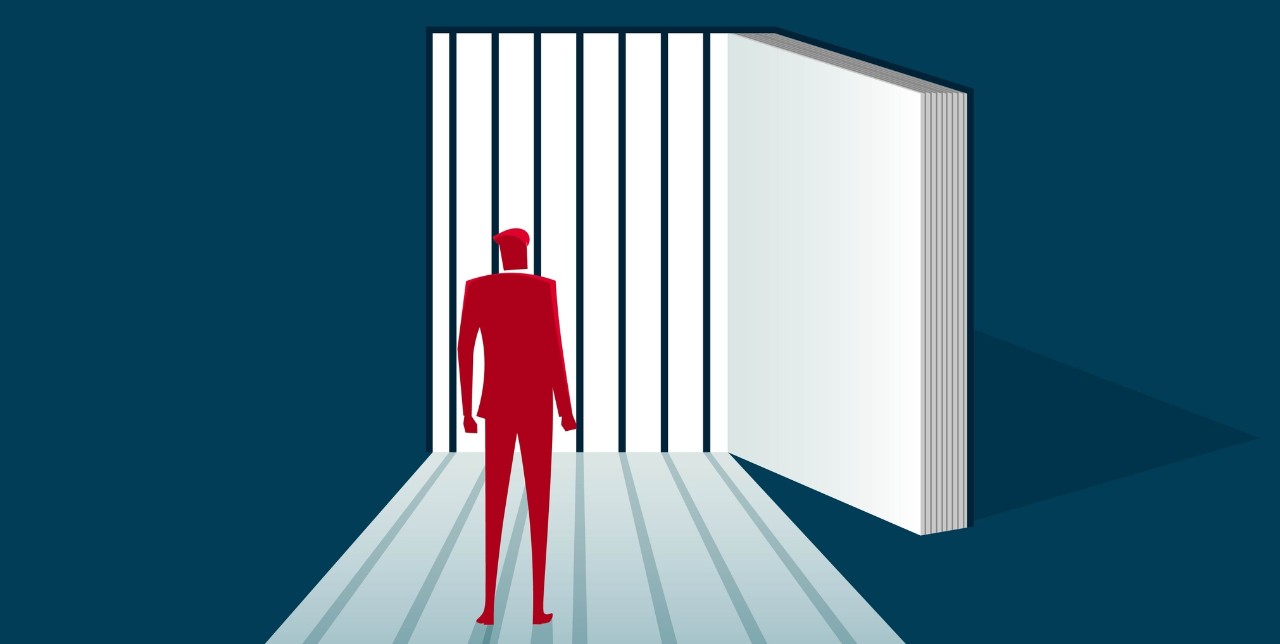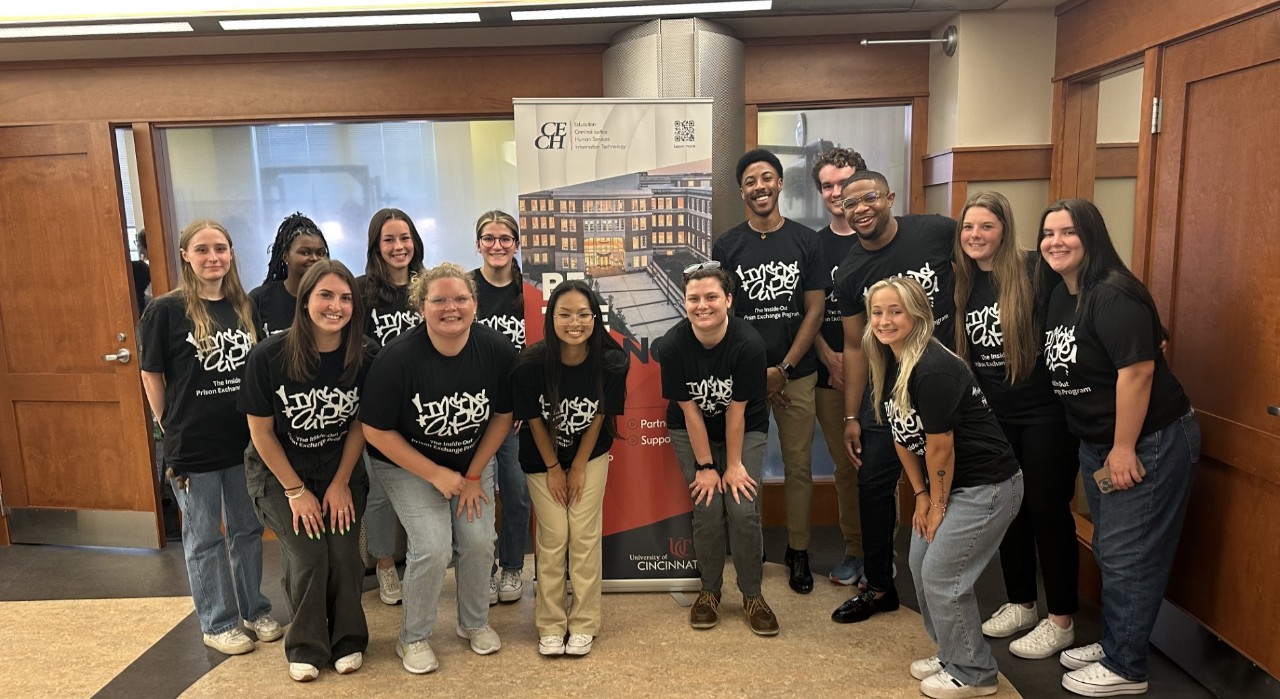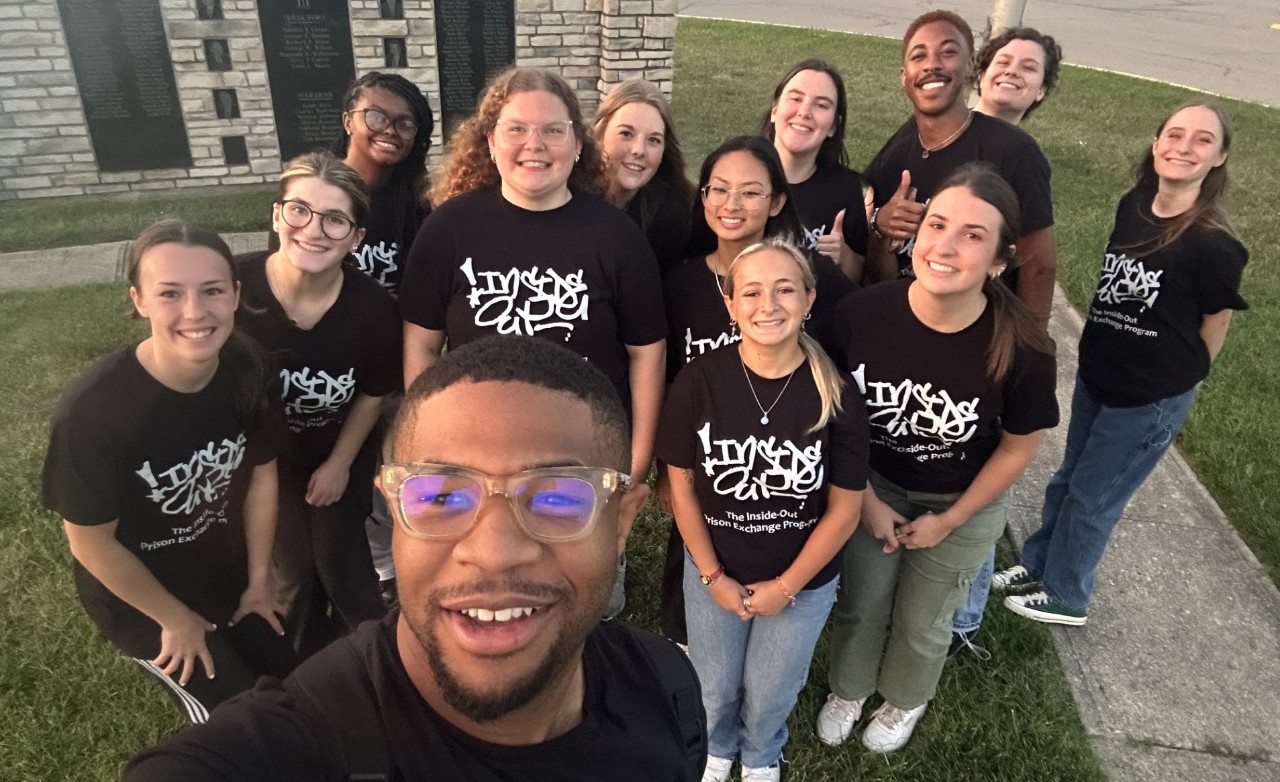
Inside-Out Prison Exchange Program: A classroom behind bars
UC criminal justice students see the realities of incarceration firsthand
In their papers for a University of Cincinnati criminal justice program, students write with such elegant prose, insight and thoughtfulness that it is difficult to discern which papers belong to UC undergrads and which papers are written by their unconventional classmates — incarcerated individuals at the Lebanon Correctional Institution in Lebanon, Ohio.
One day a week, eight UC students travel to the institution as part of the Inside-Out Prison Exchange Program, where they and eight incarcerated individuals discuss criminal justice topics such as sentencing, parole, life after prison and recidivism in a classroom setting.

Fall 2023 cohort of the first Inside-Out Prison Exchange Program at the University of Cincinnati's College of Education, Criminal Justice and Human Services. Photo provided by J.Z. Bennett.
“UC students are learning from people on the inside and the inside students are learning about diverse experiences, too,” says J.Z. Bennett, an assistant professor of criminal justice who incorporated the program into his Special Topics in Corrections class at UC in fall 2023 and will teach it again in fall 2024.
Bennett earned his doctorate in criminal justice at Temple University (where the program originated in 1997) and incorporated the program at UC when he came on board at the School of Criminal Justice — within the College of Education, Criminal Justice and Human Services — in 2022.
I know that neither of us have more value than the other, but it can’t be forgotten how the inside students are perceived outside those gates.
Shaun Skanda Third-year UC criminal justice major
In their midsemester reflection papers, UC students expressed an increase in comfort level with both the environment and the population over time. Like all visitors, they must pass through security checks, and a guard is placed inside the classroom located in the facilities’ education wing.
Third-year criminal justice major Shaun Sikanda writes that when he is physically inside the classroom having in-depth discussion with the incarcerated students, he doesn’t feel the difference in status.
“I know that neither of us have more value than the other, but it can’t be forgotten how the inside students are perceived outside those gates,” Sikanda explains, adding that the exposure to the incarcerated students “has given me the opportunity to forget our differences.”
An inside student reflected, “I’m surprised that the outside students can arrive every Wednesday with a smile on their face.” He adds that the UC students comment on everything, “as if we were telling the most interesting stories, which makes all of the inside students feel a little more human.”

Assistant professor J.Z. Bennett takes a selfie with the 2023 cohort outside of the Lebanon Correctional Institution. Students are wearing their branding Inside-Out Prison Exchange Program t-shirts. Photo provided by Bennett.
Conversations about humanity and often the lack thereof behind bars take place in both large and small groups, and there are reading assignments such as research articles on criminal justice reforms including “Mass Incarceration: The Whole Pie,” by the Prison Policy Initiative.
“Both inside and outside students displayed general agreement that America’s weak reentry process correlated with the idea of recidivism and the ‘revolving door’ theory,” writes third-year criminal justice student Katherine Fitzgerald.
“The mission of the program is to transcend the barriers that divide us and foster meaningful dialogue across differences,” says Bennett.
People are more than their worst mistakes, and the mistakes that have been made shouldn’t be what defines them.
Abby Stevens Fourth-year UC criminal justice major
From both an academic and personal perspective, fourth-year criminal justice major Abby Stevens says, “It was very awe-inspiring to witness firsthand the drawbacks of our prison systems from every incarcerated person in class.”
Professor Bennett, Stevens says, “has really helped me with being in the mindset that people are more than their worst mistakes, and that the mistakes that have been made shouldn’t be what defines them.”
The program was also incorporated into the philosophy curriculum within the university’s College of Arts and Sciences in the spring 2023 semester and is being facilitated by Jacob Ebbs, a doctoral candidate in philosophy.
Ebbs, who was trained by Bennett, learned to facilitate the program while he was earning his master’s degree in criminal justice. His students travel to the Warren Correctional Institute, also in Lebanon, Ohio.
Both the UC students and the inside students have seemed particularly engaged this semester, says Ebbs. “Both groups have reported that the class has provided them unique learning opportunities that they otherwise would not have received.”
While the UC students earn degree credit, Bennett says they are working toward a way for inside students to earn a certification.
Featured illustration at top from iStockphoto/erhui1979.
Impact Lives Here
The University of Cincinnati is leading public urban universities into a new era of innovation and impact. Our faculty, staff and students are saving lives, changing outcomes and bending the future in our city's direction. Next Lives Here.
Related Stories
From research to resume: Grad Career Week prepares students for career paths
February 20, 2026
Graduate students at the University of Cincinnati will explore how their academic and creative work translates into professional success during Grad Career Week, March 2–6, a week-long series of workshops, networking opportunities, and skill-building sessions hosted by the Graduate College.
Social media linked to student loneliness
February 20, 2026
Inside Higher Education highlighted a new study by the University of Cincinnati that found that college students across the country who spent more time on social media reported feeling more loneliness.
Discovery Amplified expands research, teaching support across A&S
February 19, 2026
The College of Arts & Sciences is investing in a bold new vision for research, teaching and creative activity through Discovery Amplified. This initiative was launched through the Dean’s Office in August 2024, and is expanding its role as a central hub for scholarly activity and research support within the Arts & Sciences (A&S) community. Designed to serve faculty, students, and staff, the initiative aims to strengthen research productivity, foster collaboration, and enhance teaching innovation. Discovery Amplified was created to help scholars define and pursue academic goals while increasing the reach and impact of A&S research and training programs locally and globally. The unit provides tailored guidance, connects collaborators, and supports strategic partnerships that promote innovation across disciplines.
